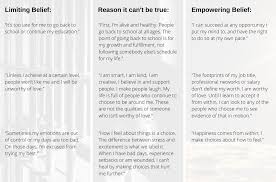Limiting beliefs are beliefs that we hold about ourselves, others, or the world around us that restrict our ability to reach our full potential. These beliefs can be deeply ingrained and often go unnoticed, but they can have a profound impact on our lives.
Limiting beliefs can take many forms. They may be beliefs about our abilities, such as “I’m not smart enough” or “I’m not talented enough.” They may be beliefs about other people, such as “People can’t be trusted” or “No one will ever love me.” They may even be beliefs about the world itself, such as “Life is hard” or “Money is evil.”
Whatever form they take, limiting beliefs are a major obstacle to personal growth and development. When we believe that we are incapable of achieving something or that the world is working against us, we are less likely to take risks and pursue our dreams. We may become stuck in negative patterns of behavior and thought that hold us back from reaching our full potential.
The good news is that limiting beliefs can be overcome. The first step is to recognize them for what they are: false and self-defeating ideas that do not serve us well. Once we have identified these limiting beliefs, we can begin to challenge them and replace them with more positive and empowering thoughts.
One effective way to challenge limiting beliefs is through self-reflection and introspection. By asking ourselves questions like “Why do I believe this?” or “What evidence do I have to support this belief?”, we can begin to see the flaws in our thinking and open ourselves up to new possibilities.
Another powerful tool for overcoming limiting beliefs is visualization. By imagining ourselves succeeding in spite of our doubts and fears, we can begin to reprogram our minds with more positive ideas about ourselves and our abilities.
Ultimately, overcoming limiting beliefs requires a willingness to take risks and step outside of our comfort zones. It requires a commitment to personal growth and a belief in our own potential. But with patience, persistence, and the right mindset, we can break free from the limitations that hold us back and achieve great things in our lives.
Overcoming Limiting Beliefs: 6 Tips for Empowering Yourself
- Identify the limiting beliefs you have
- Challenge these beliefs
- Take action towards your goals
- Reframe negative thoughts
- Seek out supportive people
- Practice self-compassion
Identify the limiting beliefs you have
Identifying the limiting beliefs that hold us back is an essential step towards personal growth and development. These beliefs can be deeply ingrained in our minds, and we may not even be aware of them. However, once we identify these beliefs, we can begin to challenge them and replace them with more positive and empowering thoughts.
To identify your limiting beliefs, start by paying attention to your thoughts and feelings. When you find yourself feeling stuck or held back in some way, ask yourself what belief might be causing this feeling. For example, if you are hesitant to apply for a new job because you don’t think you have the necessary skills, ask yourself why you believe this.
Another helpful technique is to keep a journal of your thoughts and feelings. Write down any negative thoughts or self-doubts that come up throughout the day. This will help you see patterns in your thinking and identify any recurring limiting beliefs.
It’s important to remember that identifying limiting beliefs can be uncomfortable at first. We may feel resistant or defensive about confronting these beliefs. However, it’s important to push through this discomfort and stay committed to the process of self-reflection and growth.
Once you have identified your limiting beliefs, it’s time to challenge them. Ask yourself questions like “Is this belief really true?” or “What evidence do I have to support this belief?” Look for counterexamples that contradict your limiting belief and focus on those instead.
Replacing limiting beliefs with more positive and empowering thoughts takes time and effort. But by identifying these beliefs and challenging them head-on, we can begin to break free from the limitations that hold us back and achieve greater success in our lives.
Challenge these beliefs
Limiting beliefs are negative thoughts that hold us back from achieving our full potential. These beliefs can be deeply ingrained and often go unnoticed, but they can have a profound impact on our lives. One effective way to overcome limiting beliefs is to challenge them.
Challenging limiting beliefs means questioning the validity of these negative thoughts. This process involves asking ourselves questions like “Why do I believe this?” or “What evidence do I have to support this belief?” By challenging these beliefs, we begin to see the flaws in our thinking and open ourselves up to new possibilities.
For example, if we believe that we are not smart enough to pursue a certain career path, we can challenge this belief by asking ourselves why we think this way. Is it based on past experiences or negative feedback from others? Is there any evidence that supports this belief? By examining these questions, we may realize that our belief is unfounded and not based on reality.
Once we have challenged our limiting beliefs, we can begin to replace them with more positive and empowering thoughts. We can reframe our thinking by focusing on our strengths and accomplishments rather than our perceived weaknesses. We can also visualize ourselves succeeding in spite of our doubts and fears.
It’s important to remember that overcoming limiting beliefs takes time and effort. We may need to challenge these beliefs repeatedly before they begin to lose their power over us. But with patience, persistence, and the right mindset, we can break free from the limitations that hold us back and achieve great things in our lives.
Take action towards your goals
Taking action towards your goals is a powerful way to overcome limiting beliefs. When we focus on what we can do rather than what we can’t do, we begin to see our potential and gain confidence in our abilities.
The key is to start small and take consistent steps towards our goals. This could mean setting achievable targets for ourselves and working towards them every day, or breaking down larger goals into smaller, more manageable tasks.
By taking action in this way, we begin to build momentum and create positive momentum towards our goals. We also start to challenge our limiting beliefs by proving to ourselves that we are capable of achieving the things that we once thought were impossible.
Of course, taking action can be scary. It means stepping outside of our comfort zones and facing the possibility of failure. But it’s important to remember that failure is a natural part of the learning process, and that each setback brings us closer to success.
So if you’re struggling with limiting beliefs, try taking action towards your goals today. Start small, be consistent, and believe in yourself. With time and effort, you’ll be amazed at what you can achieve.
Reframe negative thoughts
One effective way to overcome limiting beliefs is to reframe negative thoughts. Reframing involves looking at a situation from a different perspective and finding a more positive or empowering way to think about it.
For example, if you have a limiting belief that “I’m not good enough,” you might reframe that thought by saying to yourself, “I may not be perfect, but I am capable of learning and growing.” This shift in perspective can help you see yourself in a more positive light and open up new possibilities for personal growth and development.
Reframing negative thoughts can take practice, but it is a powerful tool for overcoming limiting beliefs. By challenging our negative self-talk and finding more positive ways to think about ourselves and our abilities, we can break free from the limitations that hold us back and achieve greater success in our lives.
Seek out supportive people
One of the most effective ways to overcome limiting beliefs is to seek out supportive people. When we surround ourselves with positive, encouraging individuals, we are more likely to believe in ourselves and our abilities.
Supportive people can come in many forms. They may be family members, friends, coworkers, mentors, or even strangers who share our goals and passions. What’s important is that they believe in us and our potential, and are willing to offer encouragement and support when we need it most.
When we share our goals and aspirations with supportive people, we open ourselves up to their feedback and guidance. They can offer valuable insights into how we can achieve our goals and overcome the obstacles that stand in our way. They can also remind us of our strengths and accomplishments when we are feeling discouraged or overwhelmed.
Perhaps most importantly, supportive people can help us challenge our limiting beliefs. When we express doubts or fears about our abilities or the world around us, they can offer a different perspective and help us see things in a more positive light. They can remind us of all the times we have succeeded in the past, and encourage us to keep pushing forward despite any setbacks or challenges.
Of course, finding supportive people is not always easy. It may require reaching out to new communities or joining groups that align with our interests and goals. But the effort is well worth it. Surrounding ourselves with positive influences can have a profound impact on our lives, helping us overcome limiting beliefs and achieve great things.
In short, seeking out supportive people is a powerful tip for overcoming limiting beliefs. By surrounding ourselves with positive influences who believe in us and support our goals, we can break free from self-doubt and achieve great things in our lives.
Practice self-compassion
When it comes to overcoming limiting beliefs, one of the most important things we can do is practice self-compassion. Self-compassion means treating ourselves with kindness, understanding, and forgiveness, even when we fall short of our own expectations.
Many of us are our own harshest critics. We hold ourselves to impossibly high standards and beat ourselves up when we inevitably fall short. This kind of negative self-talk can reinforce limiting beliefs and make it harder for us to break free from them.
By practicing self-compassion, we can begin to shift our focus away from our perceived shortcomings and towards our inherent worth as human beings. We can learn to treat ourselves with the same kindness and understanding that we would offer to a friend or loved one who was struggling.
Self-compassion doesn’t mean making excuses for our mistakes or ignoring areas where we need to improve. Rather, it means acknowledging that we are all imperfect human beings who are doing the best we can in any given moment.
When we practice self-compassion, we create a safe space within ourselves where it is okay to make mistakes and take risks. We become more resilient in the face of setbacks and more willing to try again when things don’t go as planned.
So if you’re struggling with limiting beliefs that are holding you back from reaching your full potential, try practicing self-compassion. Treat yourself with kindness and understanding, and remember that you are worthy of love and respect just as you are. With time and practice, you may find that your limiting beliefs begin to lose their power over you, allowing you to achieve great things in your life.



